- Home
- Bertram Mitford
The Sign of the Spider Page 4
The Sign of the Spider Read online
Page 4
CHAPTER IV.
THE LAND OF PROMISE.
The throb of the propeller has almost ceased; faint, too, is thevibration of the slowed-down engines. The _Persian_ is gliding withwell-nigh imperceptible motion through the smooth waters of Table Bay.
It is a perfect morning, cloudless in its dazzling splendour. In front,the huge Table Mountain rears its massive wall, dwarfing the mud-townlying at its base and the bristling masts of shipping, its great linemirrored in the sheeny surface. Away in the distance, the purple conesof the Hottentots Holland mountains loom thirstily through a glimmer ofsummer haze. A fair scene indeed after three weeks of endless sea andsky.
"And what are your first impressions of my native land?"
Laurence turned.
"I was thinking less of the said land than of myself," he answered. "Iwas thinking what potentialities would lie between my first impressionsof it and my last."
Just a suspicion of gravity came over Lilith Ormskirk's face at theremark.
"And are you glad the voyage is at an end, now that it is?" she went on.
"You know I am not. It was such a rest."
"Which I was everlastingly disturbing."
"By wreathing those unholy spells. Lilith, thou sorceress, how long willit be before those talks of ours are forgotten? A week, perhaps?"
"They will never be forgotten," she answered, her eyes dreamy andserious. "But now, I must go below and finish doing up my things. Weshall be in dock directly."
A great crowd is collected on the quay as the steamer warps up, abovewhich rise sunshades coloured and coquettish, pith helmets and sweepingpuggarees, and more orthodox white "stove-pipes." Then in thebackground, yellow-skinned Malays in gaudy Oriental attire,parchment-faced Hottentots, Mozambique blacks, and lighter-hued Kaffirsfrom the Eastern frontier. The docks are piled with luggage, for theprivilege of carrying which and its multifold owners Malay cab-driversare uttering shrill and competing yells. On board, people are biddingeach other good-bye or greeting those who have come to meet them; andflitting among such groups, a mingled expression of alertness andanxiety on his countenance, is here and there a steward, bent uponsounding up a possibly elusive "tip," or refreshing an inconvenientlyshort memory.
Near the gangway Lilith Ormskirk was holding quite a farewell court. Her"poodles," as Laurence had satirically defined them, were crowdingaround--Swaynston at their head--for a farewell pat. The last, in theshape of Holmes and another, had taken their sorrowful departure, andnow a quick, furtive look seemed to cross the smiling serenity of herface, a shade of wistfulness, of disappointment. Thus one in thehurrying throng at the other side of the deck read it.
"What a tail-wagging!" almost immediately spake a voice at her side.
She turned. Decidedly the expression was one of brightening.
"I thought you had gone--had forgotten to say good-bye," she said.
"I was waiting until the poodles had finally cleared. Now, however, Ihave come to utter that not always hateful word."
"Not in this instance?"
"Yes, distinctly. I have just heard there is to be a special train madeup--we are in too late for the regular mail-train, you know. So I shallleave for Kimberley in about two or three hours' time."
Lilith looked disappointed.
"I thought you would have stayed here at least a few days," she said.And then the friends who had met her on board returned, and Laurencefound himself introduced to three pretty girls--fair-haired, blue-eyed,well-dressed--eke to a man--tall, brown-faced, loosely hung, apparentlyabout thirty years of age--none of whose names he could quite succeed incatching, save that the latter was apostrophized as "George." Then,after a commonplace or two, good-byes were uttered and theyseparated--Lilith and her party to catch the train for Mowbray, her latefellow-passenger to arrange for his own much longer journey.
Having the compartment to themselves, one of the blue-eyed girls openedfire thus:
"Lilith, who is he?"
"Who?"
"He."
"Bless the child," laughed Lilith, "there were about half a hundredhe's."
"No, there was only one. Who is he? What is he?"
"I don't know," replied Lilith, affecting ignorance no longer.
"You don't know? After three weeks on board ship together? Three wholeweeks of ship life, and you have the face to tell me you don't knowanything about him. After the way in which you said good-bye to eachother, too? Oh, I saw."
"Well, I don't know."
"Or care?"
"Chaff away, if it's any fun to you," answered Lilith quite serenely, asthe trio rippled into peals of laughter.
"I liked the man, liked to talk to him on board--you are welcome to theadmission--but all I know is that he is going to Johannesburg. We maynever see each other again."
"These English Johnnies who come out here, and whom one knows nothingabout, are now and again slippery fish," gruffly spoke the brown-facedone. "Watch it, Lilith."
"I thought this one looked as if he might be interesting," said anotherof the blue-eyed girls. "Pity he wasn't staying a day or two. We mighthave got him out to the house and seen what he was made of."
"Watch it," repeated George sententiously. "Watch it, Lilith."
Meanwhile, the object of this discussion--and warning--having resignedly"passed" the Customs at the dock gates, was spinning townwards in one ofthe innumerable hansoms. Sizing up the South African metropolis, it gavehim the idea of a mud city, just dumped down wet and left to dry in thesun. Its general aspect suggested the vagaries of some sportive Titan,who, from the summit of the lofty rock wall behind it, had amusedhimself, out of office hours, by chucking down chunks of clay of allsorts and sizes, trying how near he could "lob" them into the positionof streets and squares.
At that time the railway line ended at Kimberley--the distance thence toJohannesburg, close upon three hundred miles, had to be done by stage.It occurred to Laurence that, having a couple of hours to spare, he hadbetter look up the coach-agent and secure a seat by wire.
The agent was not in his office. Laurence Stanninghame, however, whoknew the ways of similar countries, albeit a new arrival in this,inquired for that functionary's favourite bar. The reply was prompt andaccurate withal. In a few minutes, seated on stools facing each other,he and the object of his search were transacting business.
The latter did not seem entirely satisfactory. The agent could not saywhen the earliest chance might occur by regular coach. He might have towait at Kimberley--well, it might be for days, or it might be for ever.On the other hand, he might not even have to wait at all. He could nottell. Even the people at the other end could not say for certain.Laurence began to lose patience.
"See here," he said somewhat testily. "I haven't been long in yourcountry, but that's about the only reply I've been able to meet with toany question yet. Tell me, as a matter of curiosity, is there any onething you are ever certain of out here? Just one."
The agent looked at him with faint amazement.
"There is one," he said; "just one."
"Well--and that?"
"Death. That's always a dead cert. Let's liquor. Put a name to it,skipper."
The special train consisted of a mail van and a first-class carriage.There being only three or four other travellers each had a compartmentto himself, an arrangement which met with Laurence Stanninghame'sunfeigned approval. He did not want to talk--especially in a clattering,dusty railway carriage. At intervals the passengers foregathered formeals at some wayside buffet or accommodation house,--meals whosequality was in inverse ratio to the exuberance of the prices chargedtherefor,--then each would return to his own box and smoke and read andsleep away the little matter of seven hundred miles.
On they sped for hours and hours--on through sleepy Dutch villages,whose gardens and cultivation made an oasis on the surroundingflats--on, winding in a slow ascent through the gloomy grandeur of theHex River Poort, with its iron-bound heights rearing in mighty massesfrom the level valley bottom. Then it g
rew dark, and, the dim oil lampbeing inadequate for reading purposes, Laurence went to sleep.
"Afar in the desert I love to ride,"
sang Pringle, the South African bard.
"Pringle was a liar, or a lunatic," quoth Laurence Stanninghame, to whomthe passage was familiar, on opening his eyes next morning and lookingaround. For the train was speeding--when not slowing--through theidentical desert of which Pringle sang; that heart-breaking, dead-level,waterless, treeless belt known as the Karroo. Not a human habitation insight, for hours at a stretch--the same low table-topped mountainsrising hours ahead, and which never seemed to get any closer, looking,moreover, in the distant, mirage-effects, like vast slabs poised inmid-air and resting on nothing. At long intervals a group of foul andtumble-down Hottentot huts, with their squalid inhabitants--lean cursand ape-like men; their _raison d'etre_, in the shape of a flock ofprematurely aged and disappointed-looking goats, trying all they areworth to extract sustenance from the red shaly earth and its sparsegrowth of coarse bush-like herbage. Looking out on this horrible desert,the eye and the mind alike grow weary, and the latter starts speculatingin a shuddering sort of a way as to how the deuce anything human canfind it in its heart to exist in such a place. Yet though an awfuldesert in time of drought it is not always so.
But gazing forth upon the surrounding waste, Laurence was able to readinto it a certain charm--the charm of freedom, of boundlessness, sovividly standing out in contrast to his own cramped, narrow, shut-inlife. All the changed conditions--the wildness, the solitude, theflaming and unclouded sun--were as a new awakening to life. The currentof a certain joy of living, long since sluggish, congealed, now coursedswiftly and without hinderance through his being.
Now through all those hours of tedious travelling--in the flaming glowof day, or in the still, cool watches of the night, he had with him arecollection--Lilith Ormskirk's face haunted him. Those eyes seemed tofollow him--sweet, serious; or again mirthful, flashing from out theirdark fringe of lashes, but ever entrancing, ever inviting. Her wholepersonality, in fact, seemed to pervade his mind, warring for solepossession, to the exclusion of all other thought, all otherconsideration. Into the conflict his own mind entered with a zest. Itwas a psychological struggle which appealed to him, and that thoroughly.She should not, by her witchery, take entire possession. Yet therecollection of her was so potent that at length he ceased to striveagainst it. He gave way,--abandoned himself contentedly, voluptuously toits sway,--even aiding it in the pictures it conjured up. Now he sawher, as he had first passed her, day after day on board ship, withindifference, with faintly ironical curiosity; again, as when they hadfirst begun to talk together; and yet again, when he had found himselfresorting to all manner of cowardly mental expedients to persuadehimself that he did not revel in her dangerously winning attractiveness,and sweet sympathetic converse. In the monotonous three-four time beatof the wheels he could conjure up her voice--even the colonial trick ofclipping the final "r" in words ending with that letter--as to which hehad often rallied her, while secretly liking it--for this, like a touchof the brogue, can be winsome enough when uttered by pretty lips. Nowall these reflections could not but be profitless, possibly dangerous,yet they had this advantage--they helped to kill time, and that during athirty-odd-hour journey across the Karroo. Well, it is an advantage!
On through the long, hot day, and still that memory was with him. Thesolitude, the stillness, the mile after mile over the desolate andbarren waste, the novelty of the scene, the monotonous rattle of thewheels--all went to perpetuate it. Then the sun drew down to thehorizon, and the departing glow, striking upon the red soil, painted thelatter the colour of blood, making up an extraordinarily vivid study inred and blue. Overhead a cloudless sky, the horizon all aflame, and thewhole earth, far as the eye could reach, steeped in the richest purplered. Laurence fell fast asleep.
He dreamed they were steaming into Charing Cross Station. Lilith waswaiting to meet him. He swore, in his dream, because they had halted onthe railway bridge too long to take the tickets. Then he awoke. Theywere steaming slowly into a terminus, amid the familiar flashing oflamps and the rumbling of porters' trucks. But it was not CharingCross, it was Kimberley.
Not long did it take him to collect his scanty baggage and fling it intoa "cab," otherwise an open, two-seated Cape cart. Hardly had he takenhis seat than the driver uttered a war-whoop, and, with a jerk thatnearly sent its passenger somersaulting into the road, the concernstarted off as hard as its eight legs and two wheels could carry it.
The night was dark, the streets guiltless of lighting. As the trapzigzagged furiously from one side of the way to the other, now poised onone wheel, now leaping bodily into the air as it charged through a deephole or rut, it was a comfort to the said passenger to reflect that theroad being feet deep in sand one was bound to fall soft anyhow. Yet,candidly, he rather enjoyed it. After thirty-three hours in a SouthAfrican "Flying Watkin" even this spurious excitement was welcome.
They shaved corners, always on one wheel, sometimes even scraping thecorners of houses, and causing those pedestrians in their line of flightto skip like young unicorns. Then, recovering, the startled wayfarerswould hurl their choicest blessings after the cab. To these, the madcapdriver would reply with a shrill and fiendish yell, belabouring hisfrantic cattle with a view to attempting fresh feats. They succeeded. Itonly wanted a bullock-waggon coming down the street to afford them theopportunity. The bullock-waggon came. Then a dead, dull scrunch--anawful shock--and the cab was at a standstill. The waggon people openedtheir safety-valves and let off a fearful blast of profanity; thecab-driver replied in suitable and feeling terms, then backed clear ofthe wreck and whipped on.
Vastly amused by this lively experience, Laurence still ventured toexpostulate, mildly, and as a matter of form. But he got no more changeout of his present Jehu than Horace Greeley did of Hank Monk. The reply,accompanied by a jovial guffaw, was:
"All right, mister. You sit tight, and I'll fetch you through. Whichhotel did you say?"
Laurence refreshed his memory--and swaying, jerking, pounding, into rutsand holes, the chariot drew up like a hurricane blast before quite animposing-looking building at the corner of the Market Square. Havingpaid off the lunatic of the whip and stood him a drink, Laurence engageda room, and wondered what the deuce he should do with himself if delayedhere any time. For the glimpse he had obtained of the place seemed notinviting. The same crowded bars, the same roaring racket, the samedust--yea, even the same thirst. He had seen it all before in otherparts of the world.
He was destined to wonder still more, and wearily, what he should dowith himself; for nearly a week went by before he could secure a seat inthe coach. A great depression came upon him, begotten of the heat andthe drowsiness and the dust, as day after day seemed to bring with it noemancipation from the wind-swept, tin-built town, dumped down on itssurrounding flat and sad-looking desert waste. Yet nothing akin tohomesickness was there in his depression. He wanted to get onward, notto return. He was bored and in the blues. Yet, as he looked back, thefeeling which predominated was that of freedom--of having a certainmeasure of life and its prospects before him. Stay, though. His thoughtswould, at times, travel backward, and that in spite of himself, and theywould land him with a lingering, though unacknowledged, regretfulness,on the deck of the _Persian_. Well, that was only an episode. It hadpassed away out of his life, and it was as well that it had.
But--had it?
At last, to our wayfarer's unspeakable joy, deliverance came. It hadbeen Laurence's lot to travel in far worse conveyances than the regularcoaches which at that time performed the journey between Kimberley andJohannesburg, a distance of close upon three hundred miles;consequently, although not among the fortunate ones who had secured acorner seat, he managed to make himself as comfortable as any travellerin comparatively outlandish regions has a right to expect. Hisfellow-passengers consisted, for the most part, of mechanics of thebetter sort and a loquacious Jew--not at all a bad sort of fellow
--inconversation with whom he would now and then beguile the weariness ofthe route. And it was weary. The flat sameness of the treeless plains,as mile after mile brought no change; the same stony kopjes; the samedeserted and tumble-down mining structures; the sameGod-forsaken-looking Dutch homesteads, whose owners had apparently takenon the _triste_ hopelessness of their surroundings; the same miserablewayside inns, where leathery goat-flesh and bones and rice, paintedyellow, were dispensed under the title of breakfast and dinner, whattime the coach halted to change horses, and even then only served upwhen the driver was frantically vociferating, "All aboard!" Thus theyjourneyed day and night, allowing, perhaps, three hours, or four at theoutside, for sleep--on a bed. But the latter proved an institution ofdubious beneficence, because of its far from dubious animation; the said"animation" scorning blithely and imperviously accumulations of insectpowder, reaching back into the dim past, left there and added to by acountless procession of tortured travellers. Howbeit, of these and likediscomforts are such journeyings productive, wherefore they are scarcelyto be reckoned as worthy of note.

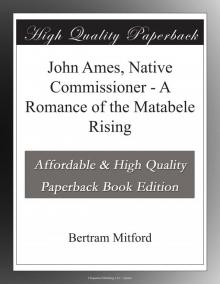 John Ames, Native Commissioner: A Romance of the Matabele Rising
John Ames, Native Commissioner: A Romance of the Matabele Rising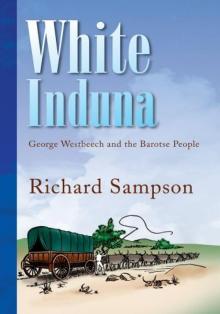 The Induna's Wife
The Induna's Wife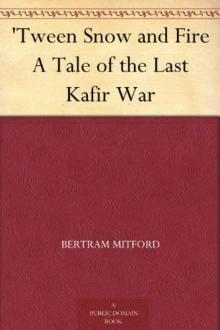 'Tween Snow and Fire: A Tale of the Last Kafir War
'Tween Snow and Fire: A Tale of the Last Kafir War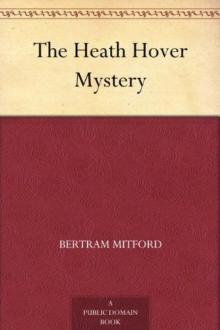 The Heath Hover Mystery
The Heath Hover Mystery The Sirdar's Oath: A Tale of the North-West Frontier
The Sirdar's Oath: A Tale of the North-West Frontier The Triumph of Hilary Blachland
The Triumph of Hilary Blachland Forging the Blades: A Tale of the Zulu Rebellion
Forging the Blades: A Tale of the Zulu Rebellion The Red Derelict
The Red Derelict The Ruby Sword: A Romance of Baluchistan
The Ruby Sword: A Romance of Baluchistan The Fire Trumpet: A Romance of the Cape Frontier
The Fire Trumpet: A Romance of the Cape Frontier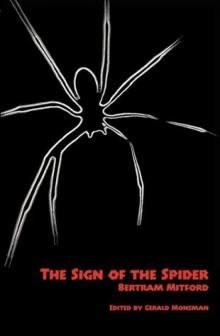 The Sign of the Spider
The Sign of the Spider